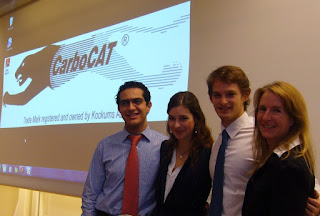This is the article I was talking about before the festive season, regarding a project we did for integrating sustainability in the business of a Swedish ship builder: Kockums AB.
(Image http://www.kockums.se/)
We were asked by the company to provide a 2-page summary of our project report, for easy communication within top-management. We were also asked to produce an article for their internal newsletter, which we then proposed to adapt for our university newsletter, 'Trunk and Branches'. I'll post an update on all that soon, for now I just wanted to share it here (I have permission), as it was a really cool project with a really cool team:
---------------
Kockums catches the waves of the future, today!
By Xavier Koenig – Master’s Student, Strategic Leadership towards Sustainability
By Xavier Koenig – Master’s Student, Strategic Leadership towards Sustainability
Blekinge Institute of Technology (BTH)
Last November Reed Evans, Isabella Wagner and Ricardo Garcia went knocking on Kockums door in Karlskrona for one of our university assignments. They asked if I would join them, and I jumped onboard when I heard of the company! Kockums AB designs, builds and maintains submarines, naval surface ships and commercial vessels in Karlskrona, Malmö and Muskö with 1000 employees.
Since customers and authorities are growing concerned about sustainability issues, Environmental Manager Rolf Petersson received us to hear more about our project. It involves a process designed to help organisations change from ‘business as usual’ to progressive sustainability oriented operations.
Full sustainability is defined with four principles:
In a sustainable society, nature is not subject to systematically increasing:
1. Concentrations of substances extracted from the Earth‘s crust,
2. Concentrations of substances produced by society,
3. Degradation by physical means,
And in this society,
4. People are not subject to conditions that systematically undermine their capacity to meet their needs.
Seeing value in the project, Rolf spoke to Mats Grähs, Head of the Composite Department, and they offered us the possibility to work on the CarboCAT® - a vessel designed primarily for offshore wind-farm maintenance services. With a time frame of five weeks for this assignment, we agreed to focus on the composite construction of this type of vessel.
Our team then met Rolf, Mats and Arne Lindstöl (CarboCAT® Project team) to kick-start the project. Mats scheduled a four hour walk-through of the composite workshop for our baseline assessment. We went through every stage of the production process asking questions about everything. Isabella, also a Masters Student in Energy Engineering, was especially intrigued by the heating system and energy aspects – “there are so many losses!” she noticed.
With answers to our extensive list, we went off for hours of research and analysis. I was glad to contribute my ship building knowledge to help keep the team in check while we assessed the sustainability performance of the CarboCAT®’s production. From his project management experience, Ricardo structured a template to process the information gathered – materials sources, wastes, recycling, alternatives, energy sources, social, economical and environmental risks, and more...
The next step? - Brainstorming with Rolf, Mats and Tim Hultberg (Systems Specialist/ Product Development) to think of possible actions to move the composite production towards sustainability. Reminder on the rules of brainstorming: as many ideas as possible, no judgement, crazy ideas encouraged! As Dr. Karl Henrick Robèrt puts it; “what is currently realistic is only allowed to influence the pace of transition, not its direction”. From this process we created a list of 142 actions.
Of course some were completely unrealistic in the short term, meaning that we need to be strategic to make progress! We prioritized the actions with a set of criteria including these three key questions: Will it take us in the right direction – viable and sustainable? Is it a flexible platform for future actions - not a dead end? Does it provide enough ROI (financial, social and environmental) to fuel further action?
For the immediate future, it is clear that the Toyota Production System currently being implemented is a smart move – efficiency and waste reduction will provide significant savings. Later, collaboration with suppliers may help develop materials for which price is not dependant on the oil market, and also materials that are not harmful to the environment. Ultimately, Kockums may build ships which benefit society beyond their operational services.
Being a leader in sustainability has an immense business potential; “As we climb mount Sustainability, with the four principles at the top, we are doing better than ever on bottom line business. This is not at the cost of social or ecological systems, but at the cost of our competitors who still haven’t got it” - Ray Anderson, CEO of Interface Inc.
Within the Strategic Management process, a visioning stage is critical. Reed was particularly keen to conduct a workshop, knowing the importance of a clear vision and high goals for a company from her consulting experience. The goal is to create an attractive vision of the future guided by the sustainability principles; only then can we be strategic to realise it. All stakeholders must be onboard to co-create this vision and help the continuous improvement of the strategic plan towards success. Unfortunately this step was not possible within our timeframe; however this work has been a unique experience, especially thanks to Kockums support.
The BTH student team would like to warmly thank Rolf Petersson, Mats Grähs, Tim Hultberg and Arne Lindstöl for their friendly collaboration, and wishes Kockums all the very best in their Sustainability journey.
---------
PS: I'm liking writing, so if you have comments or feedback I'd love to hear it. Feel free to use the comments window or shoot me an email. Tack!



No comments:
Post a Comment